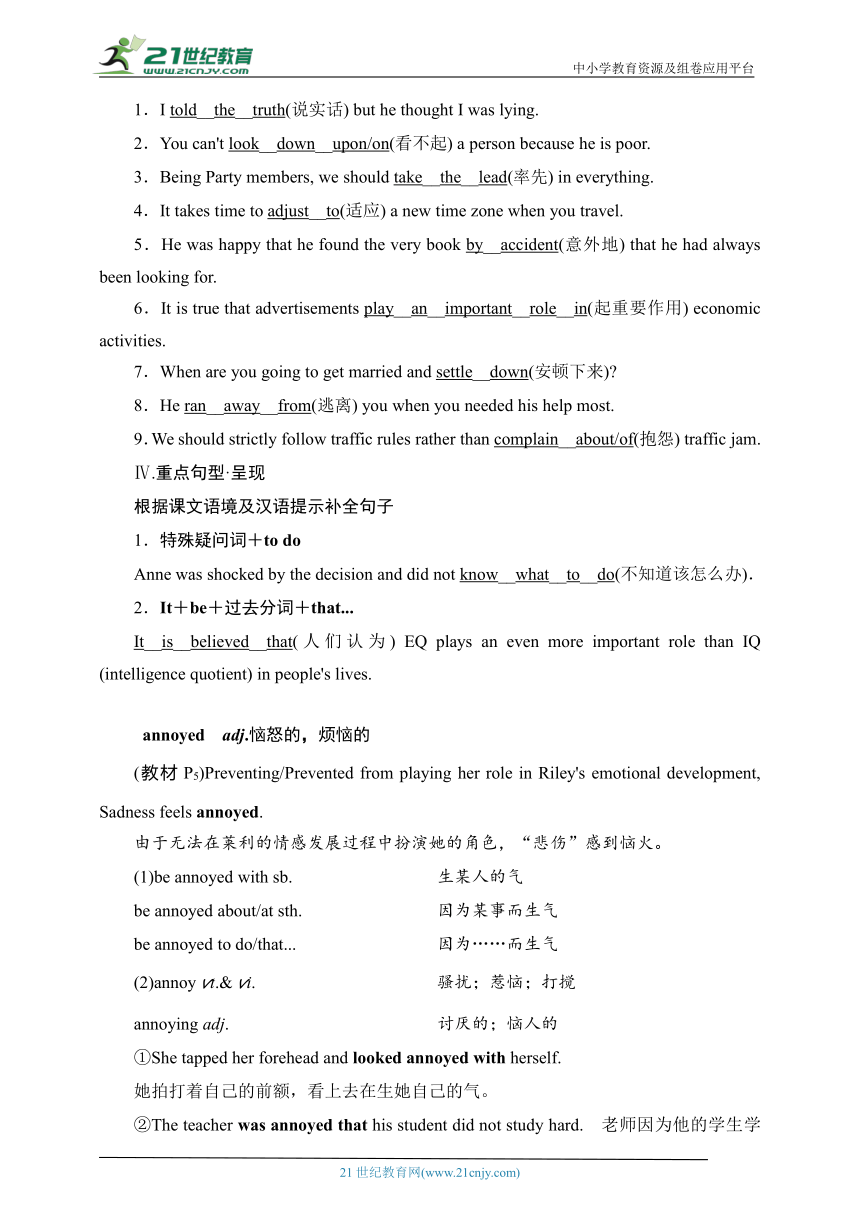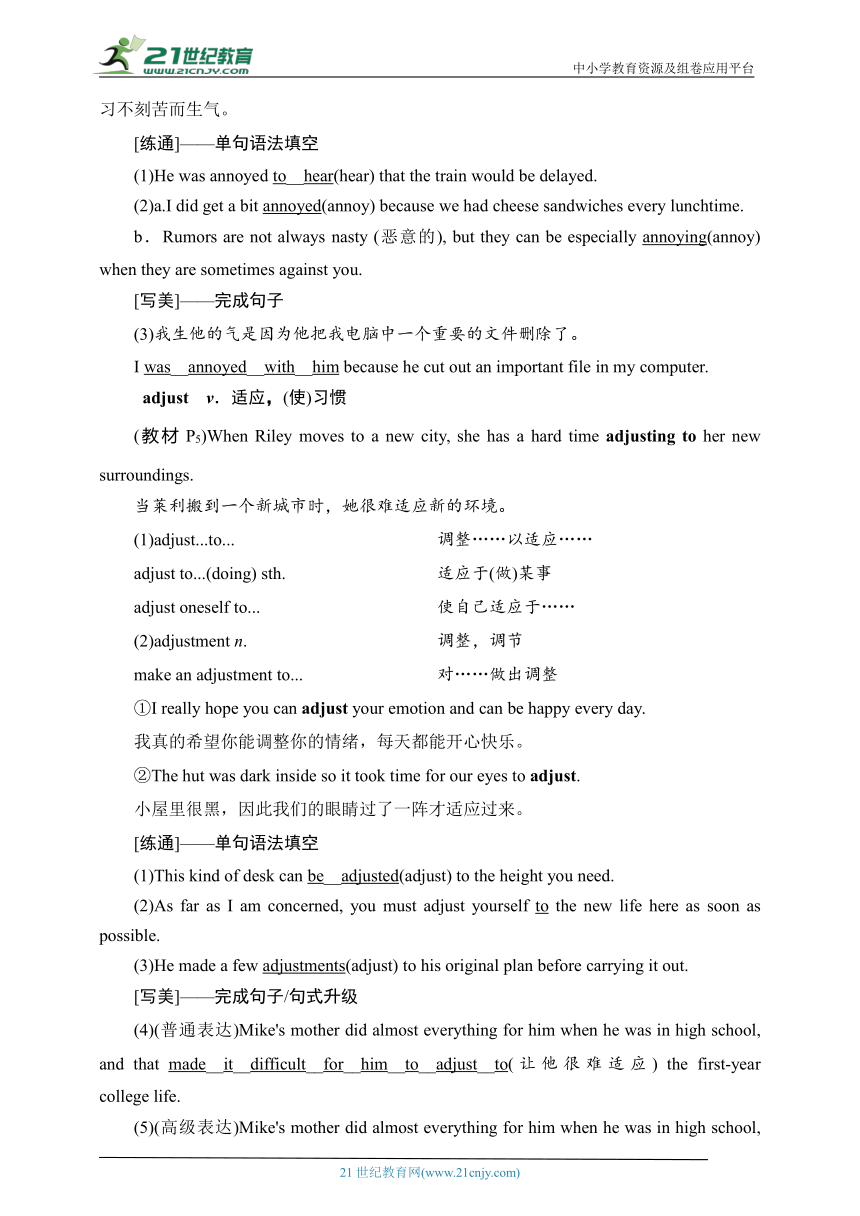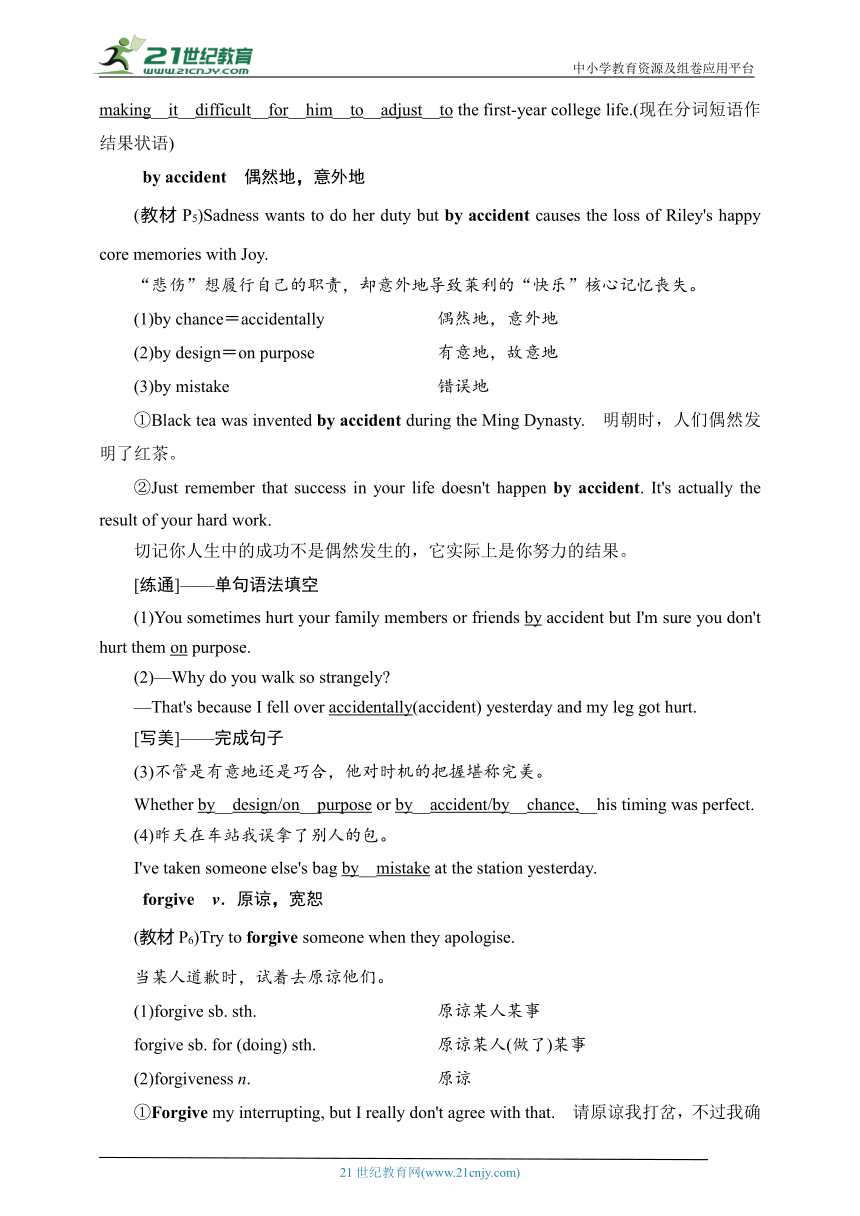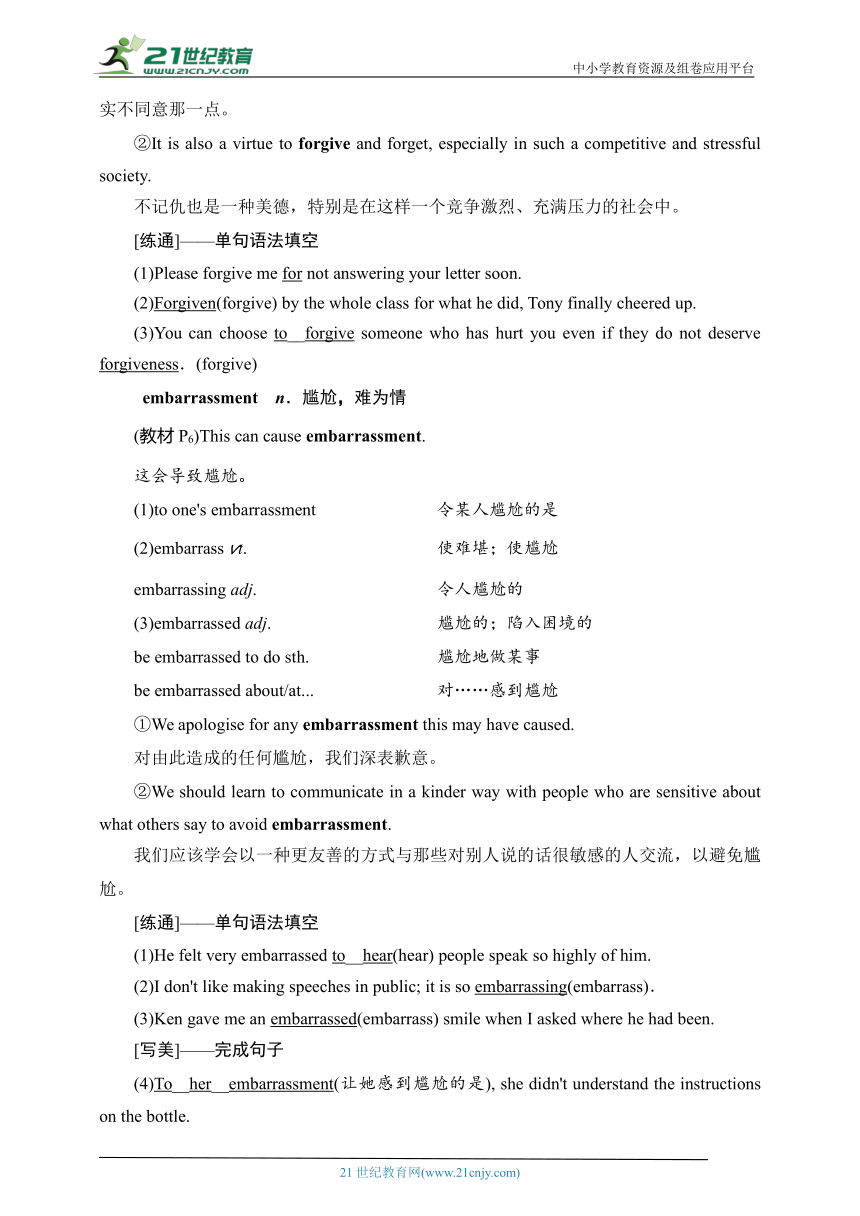高中英语外研版(2019)必修三 Unit 1 Period 3 学案
文档属性
| 名称 | 高中英语外研版(2019)必修三 Unit 1 Period 3 学案 |  | |
| 格式 | doc | ||
| 文件大小 | 1.3MB | ||
| 资源类型 | 试卷 | ||
| 版本资源 | 外研版(2019) | ||
| 科目 | 英语 | ||
| 更新时间 | 2022-12-04 11:52:05 | ||
图片预览





文档简介
中小学教育资源及组卷应用平台
Period 3 Using language
INCLUDEPICTURE"三言两语.TIF" INCLUDEPICTURE "../../../三言两语.TIF" \* MERGEFORMAT
1.An ounce of praise is worth a pound of scolding. 良言一句三冬暖,恶语伤人六月寒。
2.It's important for us to communicate with each other and share our happiness and sorrow.
对我们来说,互相交流、分享快乐并分担痛苦是很重要的。
INCLUDEPICTURE"自查语基LLL.TIF" INCLUDEPICTURE "../../../自查语基LLL.TIF" \* MERGEFORMAT
Ⅰ.核心词汇·练通
根据语境及汉语提示写出正确的单词
1.a sense of duty 责任感
2.a traffic accident 交通事故
3.the core of the problem 问题的关键所在
4.The role of the police is to ensure that the law is obeyed.
警察的职责就是确保法律得到遵守。
5.It's not a good idea to criticise someone in front of others.
人前莫论他人非。
Ⅱ.拓展词汇·用活
根据提示写出相应的单词
1.annoyed adj.愤怒的,烦恼的→annoy vt.使……不悦;惹恼→annoying adj.令人不悦的→annoyance n.烦恼
2.adjust v.适应,(使)习惯→adjustment n.调整,调节
3.complexity n.复杂性,错综复杂→complex adj.复杂的
4.forgive v.原谅,宽恕→forgiveness n.原谅
5.embarrassment n.尴尬,难为情→embarrass vt.使尴尬,使困窘→embarrassed adj.尴尬的,难堪的,困窘的→embarrassing adj.令人尴尬的,令人难堪的
Ⅲ.重点短语·再现
根据语境及汉语提示填入合适的短语
1.I told__the__truth(说实话) but he thought I was lying.
2.You can't look__down__upon/on(看不起) a person because he is poor.
3.Being Party members, we should take__the__lead(率先) in everything.
4.It takes time to adjust__to(适应) a new time zone when you travel.
5.He was happy that he found the very book by__accident(意外地) that he had always been looking for.
6.It is true that advertisements play__an__important__role__in(起重要作用) economic activities.
7.When are you going to get married and settle__down(安顿下来)
8.He ran__away__from(逃离) you when you needed his help most.
9.We should strictly follow traffic rules rather than complain__about/of(抱怨) traffic jam.
Ⅳ.重点句型·呈现
根据课文语境及汉语提示补全句子
1.特殊疑问词+to do
Anne was shocked by the decision and did not know__what__to__do(不知道该怎么办).
2.It+be+过去分词+that...
It__is__believed__that(人们认为) EQ plays an even more important role than IQ (intelligence quotient) in people's lives.
INCLUDEPICTURE"创意课堂LLL.TIF" INCLUDEPICTURE "../../../创意课堂LLL.TIF" \* MERGEFORMAT
annoyed adj.恼怒的,烦恼的
(教材P5)Preventing/Prevented from playing her role in Riley's emotional development, Sadness feels annoyed.
由于无法在莱利的情感发展过程中扮演她的角色,“悲伤”感到恼火。
(1)be annoyed with sb. 生某人的气
be annoyed about/at sth. 因为某事而生气
be annoyed to do/that... 因为……而生气
(2)annoy vt.& vi. 骚扰;惹恼;打搅
annoying adj. 讨厌的;恼人的
①She tapped her forehead and looked annoyed with herself.
她拍打着自己的前额,看上去在生她自己的气。
②The teacher was annoyed that his student did not study hard. 老师因为他的学生学习不刻苦而生气。
[练通]——单句语法填空
(1)He was annoyed to__hear(hear) that the train would be delayed.
(2)a.I did get a bit annoyed(annoy) because we had cheese sandwiches every lunchtime.
b.Rumors are not always nasty (恶意的), but they can be especially annoying(annoy) when they are sometimes against you.
[写美]——完成句子
(3)我生他的气是因为他把我电脑中一个重要的文件删除了。
I was__annoyed__with__him because he cut out an important file in my computer.
INCLUDEPICTURE"圈2.TIF" INCLUDEPICTURE "../../../圈2.TIF" \* MERGEFORMAT adjust v.适应,(使)习惯
(教材P5)When Riley moves to a new city, she has a hard time adjusting to her new surroundings.
当莱利搬到一个新城市时,她很难适应新的环境。
(1)adjust...to... 调整……以适应……
adjust to...(doing) sth. 适应于(做)某事
adjust oneself to... 使自己适应于……
(2)adjustment n. 调整,调节
make an adjustment to... 对……做出调整
①I really hope you can adjust your emotion and can be happy every day.
我真的希望你能调整你的情绪,每天都能开心快乐。
②The hut was dark inside so it took time for our eyes to adjust.
小屋里很黑,因此我们的眼睛过了一阵才适应过来。
[练通]——单句语法填空
(1)This kind of desk can be__adjusted(adjust) to the height you need.
(2)As far as I am concerned, you must adjust yourself to the new life here as soon as possible.
(3)He made a few adjustments(adjust) to his original plan before carrying it out.
[写美]——完成句子/句式升级
(4)(普通表达)Mike's mother did almost everything for him when he was in high school, and that made__it__difficult__for__him__to__adjust__to(让他很难适应) the first year college life.
(5)(高级表达)Mike's mother did almost everything for him when he was in high school, making__it__difficult__for__him__to__adjust__to the first year college life.(现在分词短语作结果状语)
INCLUDEPICTURE"圈3.TIF" INCLUDEPICTURE "../../../圈3.TIF" \* MERGEFORMAT by accident 偶然地,意外地
(教材P5)Sadness wants to do her duty but by accident causes the loss of Riley's happy core memories with Joy.
“悲伤”想履行自己的职责,却意外地导致莱利的“快乐”核心记忆丧失。
(1)by chance=accidentally 偶然地,意外地
(2)by design=on purpose 有意地,故意地
(3)by mistake 错误地
①Black tea was invented by accident during the Ming Dynasty. 明朝时,人们偶然发明了红茶。
②Just remember that success in your life doesn't happen by accident. It's actually the result of your hard work.
切记你人生中的成功不是偶然发生的,它实际上是你努力的结果。
[练通]——单句语法填空
(1)You sometimes hurt your family members or friends by accident but I'm sure you don't hurt them on purpose.
(2)—Why do you walk so strangely
—That's because I fell over accidentally(accident) yesterday and my leg got hurt.
[写美]——完成句子
(3)不管是有意地还是巧合,他对时机的把握堪称完美。
Whether by__design/on__purpose or by__accident/by__chance,__his timing was perfect.
(4)昨天在车站我误拿了别人的包。
I've taken someone else's bag by__mistake at the station yesterday.
forgive v.原谅,宽恕
(教材P6)Try to forgive someone when they apologise.
当某人道歉时,试着去原谅他们。
(1)forgive sb. sth. 原谅某人某事
forgive sb. for (doing) sth. 原谅某人(做了)某事
(2)forgiveness n. 原谅
①Forgive my interrupting, but I really don't agree with that. 请原谅我打岔,不过我确实不同意那一点。
②It is also a virtue to forgive and forget, especially in such a competitive and stressful society.
不记仇也是一种美德,特别是在这样一个竞争激烈、充满压力的社会中。
[练通]——单句语法填空
(1)Please forgive me for not answering your letter soon.
(2)Forgiven(forgive) by the whole class for what he did, Tony finally cheered up.
(3)You can choose to__forgive someone who has hurt you even if they do not deserve forgiveness.(forgive)
INCLUDEPICTURE"圈5.TIF" INCLUDEPICTURE "../../../圈5.TIF" \* MERGEFORMAT embarrassment n.尴尬,难为情
(教材P6)This can cause embarrassment.
这会导致尴尬。
(1)to one's embarrassment 令某人尴尬的是
(2)embarrass vt. 使难堪;使尴尬
embarrassing adj. 令人尴尬的
(3)embarrassed adj. 尴尬的;陷入困境的
be embarrassed to do sth. 尴尬地做某事
be embarrassed about/at... 对……感到尴尬
①We apologise for any embarrassment this may have caused.
对由此造成的任何尴尬,我们深表歉意。
②We should learn to communicate in a kinder way with people who are sensitive about what others say to avoid embarrassment.
我们应该学会以一种更友善的方式与那些对别人说的话很敏感的人交流,以避免尴尬。
[练通]——单句语法填空
(1)He felt very embarrassed to__hear(hear) people speak so highly of him.
(2)I don't like making speeches in public; it is so embarrassing(embarrass).
(3)Ken gave me an embarrassed(embarrass) smile when I asked where he had been.
[写美]——完成句子
(4)To__her__embarrassment(让她感到尴尬的是), she didn't understand the instructions on the bottle.
过去分词(短语)作状语
INCLUDEPICTURE"自主领悟LLL.TIF" INCLUDEPICTURE "../../../自主领悟LLL.TIF" \* MERGEFORMAT
?语法图解
INCLUDEPICTURE "../../../CCAB7.tif" \* MERGEFORMAT INCLUDEPICTURE "../../../CCAB7.tif" \* MERGEFORMAT
?探究发现
用括号内单词的适当形式完成下面教材中的句子并体会其语法特征
1.(教材P2)Disappointed(disappoint) by his behaviour, I said all this to my best friend.
2.(教材P2)Embarrassed(embarrass) and ashamed, I can't concentrate on anything.
3.(教材P3)Treated(treat) this way, you're sure to feel hurt—we should always be able to trust those closest to us, and it hurts even more when we find we can't.
4.(教材P3)Approached(approach) in this way, your friendship will soon be repaired.
5.(教材P3)Filled(fill) with anger, you tend to say whatever comes to your mind.
INCLUDEPICTURE"要义详析LLL.TIF" INCLUDEPICTURE "../../../要义详析LLL.TIF" \* MERGEFORMAT
一、过去分词(短语)作状语的基本用法
1.过去分词(短语)作状语的功能
过去分词(短语)作状语时,主语与过去分词(短语)表示的动作之间存在逻辑上的动宾关系,其逻辑主语通常是句子的主语。
◆Given another chance, I will do it much better.
如果再给我一次机会,我会做得更好。
◆The guest walked into the room, greeted by his owner.
客人一边和主人打招呼,一边走进了房间。
2.过去分词(短语)作状语的类型
过去分词(短语)作状语时,可以表示时间、条件、原因、让步、方式和伴随状况。过去分词(短语)作时间、条件、原因状语时可以变为相应的状语从句;过去分词(短语)作方式状语和伴随状语时可以变成并列分句。
◆Seen from this angle, the matter is not as serious as that.
=When it is seen from this angle, the matter is not as serious as that.
当从这个角度看时,这件事情没有那么严重。(时间状语)
◆Given ten more minutes, we will finish the work perfectly.
=If we are given ten more minutes, we will finish the work perfectly.
如果多给十分钟,我们会完美地完成这项工作。(条件状语)
◆Greatly touched by his words, she was full of tears.
=Because she was greatly touched by his words, she was full of tears.
由于被他的话深深地打动,她满眼泪花。(原因状语)
◆Dressed in white, she looks more beautiful.
=She is dressed in white and looks more beautiful.
她穿着白色衣服,看起来更加漂亮了。(方式状语)
◆The teacher came into the room, followed by two students.
=The teacher came into the room, and he was followed by two students.
老师走进了这个房间,后面跟着两个学生。(伴随状语)
3.过去分词(短语)作状语的位置
过去分词(短语)作条件、原因及时间状语时,通常放在句首;作伴随状语时,通常放在句末;作方式状语时,一般放在句末,有时也放在句首;作让步状语时,一般放在句首,有时也放在句末。
[即时演练1]——单句语法填空
(1)(2020·浙江卷1月)The first is declining birth rates, which means old generations are large compared(compare) to younger generations.
(2)Influenced(influence) by his father, he fell in love with literature.
(3)Time, used(use) correctly, is the money in the bank, so we should cherish every second.
(4)Offered(offer) an important role in a new movie, Andy has got a chance to become famous.
二、过去分词(短语)作状语的注意事项
1.过去分词(短语)作时间、条件或让步状语时,为了明确其意义,有时可在过去分词前加上when、 while、 if、 once、 unless、 although、 even if/even though等连词,相当于状语从句的省略。
◆Even if invited(=Even if I am invited), I will not take part in the party.
即使被邀请,我也不会参加那个宴会。
◆When offered(=When one is offered) help, one often says “Thank you.” or “It's kind of you.”
当被提供帮助的时候,人们常说“谢谢。”或“你真是太好了。”
2.过去分词(短语)作状语时,其逻辑主语必须与句子的主语保持一致,否则需加上自己的主语,构成独立主格结构。
◆Given a chance, we can surprise the world.
给我们一个机会,我们会让世界惊讶。
3.有些过去分词(短语)因源于系表结构,作状语时不表动作而表状态。例如:lost、 seated、 absorbed/lost in (沉浸于)、 buried in (埋头于)、 dressed in、 tired of等。
◆Absorbed/Lost in deep thought, he didn't hear the sound.
沉浸在深度思考之中,他没听到那个声音。
[即时演练2]——单句语法填空
(1)Absorbed(absorb)in painting, John didn't notice evening approaching.
(2)If accepted(accept) for the job, you'll be informed soon.
(3)The boy rushed in, his face covered(cover) with sweat.
三、过去分词(短语)与现在分词(短语)作状语的区别
项目 逻辑关系 时间概念
过去分词(短语)作状语 过去分词(短语)所表示的动作与句子的主语之间是逻辑上的动宾关系,即表被动 过去分词(短语)所表示的动作往往发生于谓语动词所表示的动作之前,或表示一种状态,与谓语动词所表示的动作同时发生或存在
现在分词(短语)作状语 现在分词(短语)所表示的动作与句子的主语之间是逻辑上的主谓关系,即表主动 现在分词(短语)的一般式表示的动作与谓语动词所表示的动作同时发生或几乎同时发生;现在分词的完成式表示的动作发生在谓语动词所表示的动作之前
◆Seeing from the hill, you will find the city looks like a big garden.
从山上看,你会发现这座城市看起来像一个大花园。
◆Seen from the hill, the city looks like a big garden.
从山上看,这座城市看起来像一个大花园。
◆Following the old man, we went upstairs.
我们跟着那位老人,上楼去了。
◆Followed by the old man, we went upstairs.
我们被那位老人跟着,上楼去了。
[即时演练3]——单句语法填空
(1)(2020·天津卷5月)Completed(complete)in 1931, the Empire State Building, the highest skyscraper until 1954, inspired the imagination of the world.
(2)Used(use) for a long time, the book looks old.
(3)Using(use) the book, I find it useful to learn English.
(4)Having__finished(finish) his homework, the boy began to watch TV.
INCLUDEPICTURE"课堂微练LLL.TIF" INCLUDEPICTURE "../../../课堂微练LLL.TIF" \* MERGEFORMAT
Ⅰ.同义句转换
1.As he was surrounded by a group of young people, the old man felt happy.
→ Surrounded__by a group of young people, the old man felt happy.
2.When he was asked what had happened, he lowered his head.
→Asked what had happened, he lowered his head.
→When__asked what had happened, he lowered his head.
3.Bob sat on his chair and he was completely absorbed in a magazine.
→Bob sat on his chair, completely__absorbed__in a magazine.
4.I won't attend his birthday party unless I was invited.
→I won't attend his birthday party unless__invited.
5.After the problem was settled, the meeting came to an end.
→The__problem__settled,__the meeting came to an end.
Ⅱ.语法与写作
1.那个年轻人被提醒了很多次,依然犯同样的错误。
Reminded__many__times,__the young man still made the same mistake.
2.一旦失去, 这样的机会可能永远不会再有了。
Once__lost,__such a chance might never come again.
3.受他的影响,越来越多的人喜欢上了户外活动。
Influenced__by__him,__more and more people fall in love with outdoor activities.
4.因受伤严重,司机和乘客都被送往了医院。
Seriously__injured,__the driver and passengers were sent to hospital.
5.被老师的话所鼓舞,他继续他的研究工作。
Encouraged__by__his__teacher's__words,__he went on with his research work.
INCLUDEPICTURE"课下小练LLL.TIF" INCLUDEPICTURE "../../../课下小练LLL.TIF" \* MERGEFORMAT
21世纪教育网 www.21cnjy.com 精品试卷·第 2 页 (共 2 页)
HYPERLINK "http://www.21cnjy.com/" 21世纪教育网(www.21cnjy.com)
Period 3 Using language
INCLUDEPICTURE"三言两语.TIF" INCLUDEPICTURE "../../../三言两语.TIF" \* MERGEFORMAT
1.An ounce of praise is worth a pound of scolding. 良言一句三冬暖,恶语伤人六月寒。
2.It's important for us to communicate with each other and share our happiness and sorrow.
对我们来说,互相交流、分享快乐并分担痛苦是很重要的。
INCLUDEPICTURE"自查语基LLL.TIF" INCLUDEPICTURE "../../../自查语基LLL.TIF" \* MERGEFORMAT
Ⅰ.核心词汇·练通
根据语境及汉语提示写出正确的单词
1.a sense of duty 责任感
2.a traffic accident 交通事故
3.the core of the problem 问题的关键所在
4.The role of the police is to ensure that the law is obeyed.
警察的职责就是确保法律得到遵守。
5.It's not a good idea to criticise someone in front of others.
人前莫论他人非。
Ⅱ.拓展词汇·用活
根据提示写出相应的单词
1.annoyed adj.愤怒的,烦恼的→annoy vt.使……不悦;惹恼→annoying adj.令人不悦的→annoyance n.烦恼
2.adjust v.适应,(使)习惯→adjustment n.调整,调节
3.complexity n.复杂性,错综复杂→complex adj.复杂的
4.forgive v.原谅,宽恕→forgiveness n.原谅
5.embarrassment n.尴尬,难为情→embarrass vt.使尴尬,使困窘→embarrassed adj.尴尬的,难堪的,困窘的→embarrassing adj.令人尴尬的,令人难堪的
Ⅲ.重点短语·再现
根据语境及汉语提示填入合适的短语
1.I told__the__truth(说实话) but he thought I was lying.
2.You can't look__down__upon/on(看不起) a person because he is poor.
3.Being Party members, we should take__the__lead(率先) in everything.
4.It takes time to adjust__to(适应) a new time zone when you travel.
5.He was happy that he found the very book by__accident(意外地) that he had always been looking for.
6.It is true that advertisements play__an__important__role__in(起重要作用) economic activities.
7.When are you going to get married and settle__down(安顿下来)
8.He ran__away__from(逃离) you when you needed his help most.
9.We should strictly follow traffic rules rather than complain__about/of(抱怨) traffic jam.
Ⅳ.重点句型·呈现
根据课文语境及汉语提示补全句子
1.特殊疑问词+to do
Anne was shocked by the decision and did not know__what__to__do(不知道该怎么办).
2.It+be+过去分词+that...
It__is__believed__that(人们认为) EQ plays an even more important role than IQ (intelligence quotient) in people's lives.
INCLUDEPICTURE"创意课堂LLL.TIF" INCLUDEPICTURE "../../../创意课堂LLL.TIF" \* MERGEFORMAT
annoyed adj.恼怒的,烦恼的
(教材P5)Preventing/Prevented from playing her role in Riley's emotional development, Sadness feels annoyed.
由于无法在莱利的情感发展过程中扮演她的角色,“悲伤”感到恼火。
(1)be annoyed with sb. 生某人的气
be annoyed about/at sth. 因为某事而生气
be annoyed to do/that... 因为……而生气
(2)annoy vt.& vi. 骚扰;惹恼;打搅
annoying adj. 讨厌的;恼人的
①She tapped her forehead and looked annoyed with herself.
她拍打着自己的前额,看上去在生她自己的气。
②The teacher was annoyed that his student did not study hard. 老师因为他的学生学习不刻苦而生气。
[练通]——单句语法填空
(1)He was annoyed to__hear(hear) that the train would be delayed.
(2)a.I did get a bit annoyed(annoy) because we had cheese sandwiches every lunchtime.
b.Rumors are not always nasty (恶意的), but they can be especially annoying(annoy) when they are sometimes against you.
[写美]——完成句子
(3)我生他的气是因为他把我电脑中一个重要的文件删除了。
I was__annoyed__with__him because he cut out an important file in my computer.
INCLUDEPICTURE"圈2.TIF" INCLUDEPICTURE "../../../圈2.TIF" \* MERGEFORMAT adjust v.适应,(使)习惯
(教材P5)When Riley moves to a new city, she has a hard time adjusting to her new surroundings.
当莱利搬到一个新城市时,她很难适应新的环境。
(1)adjust...to... 调整……以适应……
adjust to...(doing) sth. 适应于(做)某事
adjust oneself to... 使自己适应于……
(2)adjustment n. 调整,调节
make an adjustment to... 对……做出调整
①I really hope you can adjust your emotion and can be happy every day.
我真的希望你能调整你的情绪,每天都能开心快乐。
②The hut was dark inside so it took time for our eyes to adjust.
小屋里很黑,因此我们的眼睛过了一阵才适应过来。
[练通]——单句语法填空
(1)This kind of desk can be__adjusted(adjust) to the height you need.
(2)As far as I am concerned, you must adjust yourself to the new life here as soon as possible.
(3)He made a few adjustments(adjust) to his original plan before carrying it out.
[写美]——完成句子/句式升级
(4)(普通表达)Mike's mother did almost everything for him when he was in high school, and that made__it__difficult__for__him__to__adjust__to(让他很难适应) the first year college life.
(5)(高级表达)Mike's mother did almost everything for him when he was in high school, making__it__difficult__for__him__to__adjust__to the first year college life.(现在分词短语作结果状语)
INCLUDEPICTURE"圈3.TIF" INCLUDEPICTURE "../../../圈3.TIF" \* MERGEFORMAT by accident 偶然地,意外地
(教材P5)Sadness wants to do her duty but by accident causes the loss of Riley's happy core memories with Joy.
“悲伤”想履行自己的职责,却意外地导致莱利的“快乐”核心记忆丧失。
(1)by chance=accidentally 偶然地,意外地
(2)by design=on purpose 有意地,故意地
(3)by mistake 错误地
①Black tea was invented by accident during the Ming Dynasty. 明朝时,人们偶然发明了红茶。
②Just remember that success in your life doesn't happen by accident. It's actually the result of your hard work.
切记你人生中的成功不是偶然发生的,它实际上是你努力的结果。
[练通]——单句语法填空
(1)You sometimes hurt your family members or friends by accident but I'm sure you don't hurt them on purpose.
(2)—Why do you walk so strangely
—That's because I fell over accidentally(accident) yesterday and my leg got hurt.
[写美]——完成句子
(3)不管是有意地还是巧合,他对时机的把握堪称完美。
Whether by__design/on__purpose or by__accident/by__chance,__his timing was perfect.
(4)昨天在车站我误拿了别人的包。
I've taken someone else's bag by__mistake at the station yesterday.
forgive v.原谅,宽恕
(教材P6)Try to forgive someone when they apologise.
当某人道歉时,试着去原谅他们。
(1)forgive sb. sth. 原谅某人某事
forgive sb. for (doing) sth. 原谅某人(做了)某事
(2)forgiveness n. 原谅
①Forgive my interrupting, but I really don't agree with that. 请原谅我打岔,不过我确实不同意那一点。
②It is also a virtue to forgive and forget, especially in such a competitive and stressful society.
不记仇也是一种美德,特别是在这样一个竞争激烈、充满压力的社会中。
[练通]——单句语法填空
(1)Please forgive me for not answering your letter soon.
(2)Forgiven(forgive) by the whole class for what he did, Tony finally cheered up.
(3)You can choose to__forgive someone who has hurt you even if they do not deserve forgiveness.(forgive)
INCLUDEPICTURE"圈5.TIF" INCLUDEPICTURE "../../../圈5.TIF" \* MERGEFORMAT embarrassment n.尴尬,难为情
(教材P6)This can cause embarrassment.
这会导致尴尬。
(1)to one's embarrassment 令某人尴尬的是
(2)embarrass vt. 使难堪;使尴尬
embarrassing adj. 令人尴尬的
(3)embarrassed adj. 尴尬的;陷入困境的
be embarrassed to do sth. 尴尬地做某事
be embarrassed about/at... 对……感到尴尬
①We apologise for any embarrassment this may have caused.
对由此造成的任何尴尬,我们深表歉意。
②We should learn to communicate in a kinder way with people who are sensitive about what others say to avoid embarrassment.
我们应该学会以一种更友善的方式与那些对别人说的话很敏感的人交流,以避免尴尬。
[练通]——单句语法填空
(1)He felt very embarrassed to__hear(hear) people speak so highly of him.
(2)I don't like making speeches in public; it is so embarrassing(embarrass).
(3)Ken gave me an embarrassed(embarrass) smile when I asked where he had been.
[写美]——完成句子
(4)To__her__embarrassment(让她感到尴尬的是), she didn't understand the instructions on the bottle.
过去分词(短语)作状语
INCLUDEPICTURE"自主领悟LLL.TIF" INCLUDEPICTURE "../../../自主领悟LLL.TIF" \* MERGEFORMAT
?语法图解
INCLUDEPICTURE "../../../CCAB7.tif" \* MERGEFORMAT INCLUDEPICTURE "../../../CCAB7.tif" \* MERGEFORMAT
?探究发现
用括号内单词的适当形式完成下面教材中的句子并体会其语法特征
1.(教材P2)Disappointed(disappoint) by his behaviour, I said all this to my best friend.
2.(教材P2)Embarrassed(embarrass) and ashamed, I can't concentrate on anything.
3.(教材P3)Treated(treat) this way, you're sure to feel hurt—we should always be able to trust those closest to us, and it hurts even more when we find we can't.
4.(教材P3)Approached(approach) in this way, your friendship will soon be repaired.
5.(教材P3)Filled(fill) with anger, you tend to say whatever comes to your mind.
INCLUDEPICTURE"要义详析LLL.TIF" INCLUDEPICTURE "../../../要义详析LLL.TIF" \* MERGEFORMAT
一、过去分词(短语)作状语的基本用法
1.过去分词(短语)作状语的功能
过去分词(短语)作状语时,主语与过去分词(短语)表示的动作之间存在逻辑上的动宾关系,其逻辑主语通常是句子的主语。
◆Given another chance, I will do it much better.
如果再给我一次机会,我会做得更好。
◆The guest walked into the room, greeted by his owner.
客人一边和主人打招呼,一边走进了房间。
2.过去分词(短语)作状语的类型
过去分词(短语)作状语时,可以表示时间、条件、原因、让步、方式和伴随状况。过去分词(短语)作时间、条件、原因状语时可以变为相应的状语从句;过去分词(短语)作方式状语和伴随状语时可以变成并列分句。
◆Seen from this angle, the matter is not as serious as that.
=When it is seen from this angle, the matter is not as serious as that.
当从这个角度看时,这件事情没有那么严重。(时间状语)
◆Given ten more minutes, we will finish the work perfectly.
=If we are given ten more minutes, we will finish the work perfectly.
如果多给十分钟,我们会完美地完成这项工作。(条件状语)
◆Greatly touched by his words, she was full of tears.
=Because she was greatly touched by his words, she was full of tears.
由于被他的话深深地打动,她满眼泪花。(原因状语)
◆Dressed in white, she looks more beautiful.
=She is dressed in white and looks more beautiful.
她穿着白色衣服,看起来更加漂亮了。(方式状语)
◆The teacher came into the room, followed by two students.
=The teacher came into the room, and he was followed by two students.
老师走进了这个房间,后面跟着两个学生。(伴随状语)
3.过去分词(短语)作状语的位置
过去分词(短语)作条件、原因及时间状语时,通常放在句首;作伴随状语时,通常放在句末;作方式状语时,一般放在句末,有时也放在句首;作让步状语时,一般放在句首,有时也放在句末。
[即时演练1]——单句语法填空
(1)(2020·浙江卷1月)The first is declining birth rates, which means old generations are large compared(compare) to younger generations.
(2)Influenced(influence) by his father, he fell in love with literature.
(3)Time, used(use) correctly, is the money in the bank, so we should cherish every second.
(4)Offered(offer) an important role in a new movie, Andy has got a chance to become famous.
二、过去分词(短语)作状语的注意事项
1.过去分词(短语)作时间、条件或让步状语时,为了明确其意义,有时可在过去分词前加上when、 while、 if、 once、 unless、 although、 even if/even though等连词,相当于状语从句的省略。
◆Even if invited(=Even if I am invited), I will not take part in the party.
即使被邀请,我也不会参加那个宴会。
◆When offered(=When one is offered) help, one often says “Thank you.” or “It's kind of you.”
当被提供帮助的时候,人们常说“谢谢。”或“你真是太好了。”
2.过去分词(短语)作状语时,其逻辑主语必须与句子的主语保持一致,否则需加上自己的主语,构成独立主格结构。
◆Given a chance, we can surprise the world.
给我们一个机会,我们会让世界惊讶。
3.有些过去分词(短语)因源于系表结构,作状语时不表动作而表状态。例如:lost、 seated、 absorbed/lost in (沉浸于)、 buried in (埋头于)、 dressed in、 tired of等。
◆Absorbed/Lost in deep thought, he didn't hear the sound.
沉浸在深度思考之中,他没听到那个声音。
[即时演练2]——单句语法填空
(1)Absorbed(absorb)in painting, John didn't notice evening approaching.
(2)If accepted(accept) for the job, you'll be informed soon.
(3)The boy rushed in, his face covered(cover) with sweat.
三、过去分词(短语)与现在分词(短语)作状语的区别
项目 逻辑关系 时间概念
过去分词(短语)作状语 过去分词(短语)所表示的动作与句子的主语之间是逻辑上的动宾关系,即表被动 过去分词(短语)所表示的动作往往发生于谓语动词所表示的动作之前,或表示一种状态,与谓语动词所表示的动作同时发生或存在
现在分词(短语)作状语 现在分词(短语)所表示的动作与句子的主语之间是逻辑上的主谓关系,即表主动 现在分词(短语)的一般式表示的动作与谓语动词所表示的动作同时发生或几乎同时发生;现在分词的完成式表示的动作发生在谓语动词所表示的动作之前
◆Seeing from the hill, you will find the city looks like a big garden.
从山上看,你会发现这座城市看起来像一个大花园。
◆Seen from the hill, the city looks like a big garden.
从山上看,这座城市看起来像一个大花园。
◆Following the old man, we went upstairs.
我们跟着那位老人,上楼去了。
◆Followed by the old man, we went upstairs.
我们被那位老人跟着,上楼去了。
[即时演练3]——单句语法填空
(1)(2020·天津卷5月)Completed(complete)in 1931, the Empire State Building, the highest skyscraper until 1954, inspired the imagination of the world.
(2)Used(use) for a long time, the book looks old.
(3)Using(use) the book, I find it useful to learn English.
(4)Having__finished(finish) his homework, the boy began to watch TV.
INCLUDEPICTURE"课堂微练LLL.TIF" INCLUDEPICTURE "../../../课堂微练LLL.TIF" \* MERGEFORMAT
Ⅰ.同义句转换
1.As he was surrounded by a group of young people, the old man felt happy.
→ Surrounded__by a group of young people, the old man felt happy.
2.When he was asked what had happened, he lowered his head.
→Asked what had happened, he lowered his head.
→When__asked what had happened, he lowered his head.
3.Bob sat on his chair and he was completely absorbed in a magazine.
→Bob sat on his chair, completely__absorbed__in a magazine.
4.I won't attend his birthday party unless I was invited.
→I won't attend his birthday party unless__invited.
5.After the problem was settled, the meeting came to an end.
→The__problem__settled,__the meeting came to an end.
Ⅱ.语法与写作
1.那个年轻人被提醒了很多次,依然犯同样的错误。
Reminded__many__times,__the young man still made the same mistake.
2.一旦失去, 这样的机会可能永远不会再有了。
Once__lost,__such a chance might never come again.
3.受他的影响,越来越多的人喜欢上了户外活动。
Influenced__by__him,__more and more people fall in love with outdoor activities.
4.因受伤严重,司机和乘客都被送往了医院。
Seriously__injured,__the driver and passengers were sent to hospital.
5.被老师的话所鼓舞,他继续他的研究工作。
Encouraged__by__his__teacher's__words,__he went on with his research work.
INCLUDEPICTURE"课下小练LLL.TIF" INCLUDEPICTURE "../../../课下小练LLL.TIF" \* MERGEFORMAT
21世纪教育网 www.21cnjy.com 精品试卷·第 2 页 (共 2 页)
HYPERLINK "http://www.21cnjy.com/" 21世纪教育网(www.21cnjy.com)
